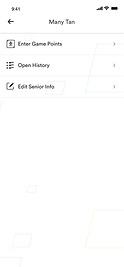Cassandra Ei Lyn
Problem
Caring for individuals with dementia can be complex and emotionally demanding, especially as changes in cognitive performance are often difficult to track. Caregivers struggle to understand how their loved one is doing day-to-day. Without clear insight into progress or decline, they may miss early warning signs or delay seeking professional advice. While there are cognitive games designed for individuals with dementia, caregivers often lack tools to interpret results or observe trends over time. At the same time, researchers working in dementia care need aggregated user insights to evaluate the effectiveness of interventions, monitor demographic patterns, and improve support strategies.

Designed for Caregivers
Process
The application was developed through a user-centered design process that involved interviews and usability testing with caregivers, healthcare professionals, and dementia researchers. Iterative prototyping cycles were conducted to refine the interface for both non-technical caregivers and clinical researchers. Key feedback focused on simplifying the interface, presenting meaningful visualisations, and clarifying the purpose of progress tracking.Automated tracking with notification of sharp changes to seek further advice are provided.



Designed for Caregivers
Rewards
A rewards system motivates users to continue playing to by earning points and redeeming rewards, while also keeping track of their items and reward history.


Designed for Caregivers
Solution
The result is a dual-facing digital platform: one for caregivers and one for researchers. Caregivers can record and track the performance of dementia-related cognitive games played by the person they care for. Through intuitive dashboards, they can view trends, identify sharp changes in performance, and receive visual cues that suggest when to consult a gerontologist, serving as a preemptive, non-clinical monitoring tool. Researchers, on the other hand, have access to data dashboards that allow for the analysis of user profiles, demographic breakdowns, cognitive scoring trends, and visual representations of engagement and decline across different user segments.




Designed for Researchers
